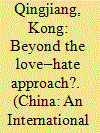| Srl | Item |
| 1 |
ID:
152276


|
|
|
|
|
| Summary/Abstract |
There is a growing concern that China has become more assertive in its foreign policies. The fear is whether China’s economic growth may translate into modern and effective military advancement. This engenders the critical question of whether China feels comfortable in the current international order, which is defined by international law and institutions. This article argues that the Chinese approach to international law and institutions is tightly associated with its evolving perception of sovereignty, and national interests vis-à-vis international law and institutions, and is characterised by a love–hate attitude towards them. With its opening up, China now views multilateralism as a way for the international community to constrain the capriciousness of a superpower, and regards the international institutions simply as power-sharing development. However, China’s integration in international institutions represents its attempt to work within international norms to pursue its interests. China’s ambivalence towards international judicial settlement of disputes signals the historical legacy as well as China’s uneasiness with playing an active role in international institution-building and rule-making.
|
|
|
|
|
|
|
|
|
|
|
|
|
|
|
|
| 2 |
ID:
073990


|
|
|
|
|
| Publication |
2006.
|
| Summary/Abstract |
This article confronts the problem of private authorities engaging in rule-making activities for public purposes. This form of rule-making raises questions about the justice, authority and, most importantly, legitimacy of these institutional arrangements. The private authority that creates rules in the international financial system relies on claims of efficiency and expertise. These claims focus on the rules created rather than the institutions that create them, institutions that are private and thus self-interested in a different way from public authorities. The article explores these issues through a review of the role of banks that engage in rule-making at the global level.
|
|
|
|
|
|
|
|
|
|
|
|
|
|
|
|